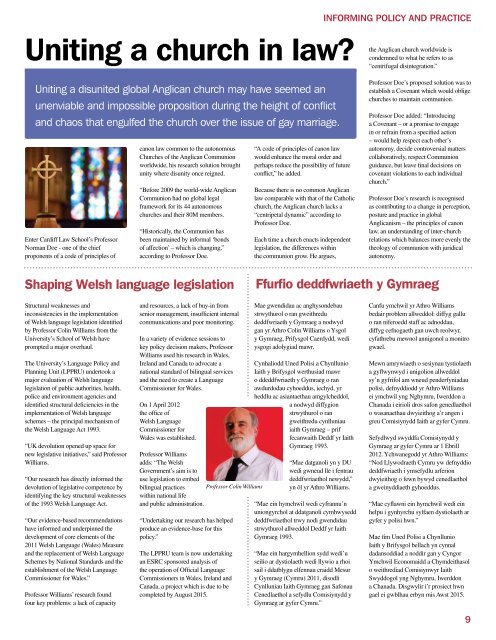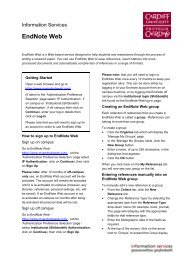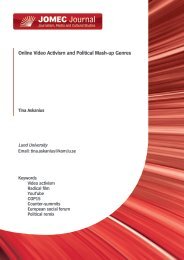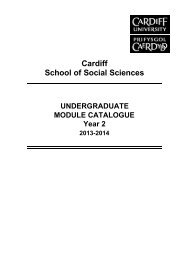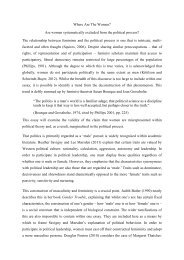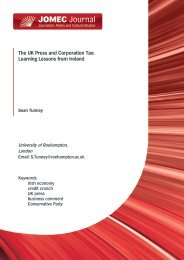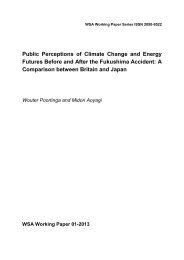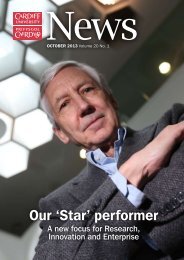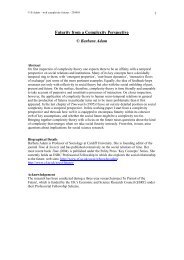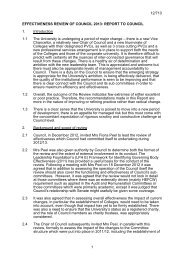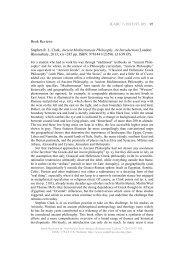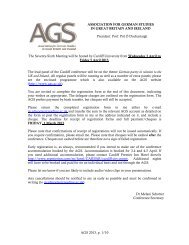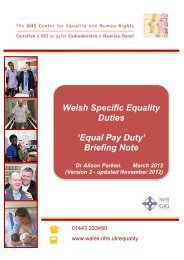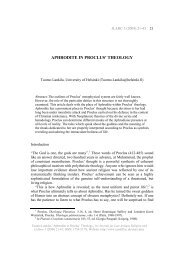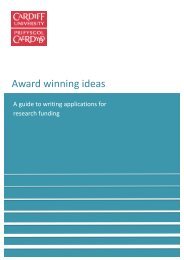January's issue of Cardiff University News
January's issue of Cardiff University News
January's issue of Cardiff University News
Create successful ePaper yourself
Turn your PDF publications into a flip-book with our unique Google optimized e-Paper software.
INFORMING POLICY AND PRACTICE<br />
Uniting a church in law?<br />
Uniting a disunited global Anglican church may have seemed an<br />
unenviable and impossible proposition during the height <strong>of</strong> conflict<br />
and chaos that engulfed the church over the <strong>issue</strong> <strong>of</strong> gay marriage.<br />
Enter <strong>Cardiff</strong> Law School’s Pr<strong>of</strong>essor<br />
Norman Doe - one <strong>of</strong> the chief<br />
proponents <strong>of</strong> a code <strong>of</strong> principles <strong>of</strong><br />
canon law common to the autonomous<br />
Churches <strong>of</strong> the Anglican Communion<br />
worldwide, his research solution brought<br />
unity where disunity once reigned.<br />
“Before 2009 the world-wide Anglican<br />
Communion had no global legal<br />
framework for its 44 autonomous<br />
churches and their 80M members.<br />
“Historically, the Communion has<br />
been maintained by informal ‘bonds<br />
<strong>of</strong> affection’ – which is changing,”<br />
according to Pr<strong>of</strong>essor Doe.<br />
“A code <strong>of</strong> principles <strong>of</strong> canon law<br />
would enhance the moral order and<br />
perhaps reduce the possibility <strong>of</strong> future<br />
conflict,” he added.<br />
Because there is no common Anglican<br />
law comparable with that <strong>of</strong> the Catholic<br />
church, the Anglican church lacks a<br />
“centripetal dynamic” according to<br />
Pr<strong>of</strong>essor Doe.<br />
Each time a church enacts independent<br />
legislation, the differences within<br />
the communion grow. He argues,<br />
the Anglican church worldwide is<br />
condemned to what he refers to as<br />
“centrifugal disintegration.”<br />
Pr<strong>of</strong>essor Doe’s proposed solution was to<br />
establish a Covenant which would oblige<br />
churches to maintain communion.<br />
Pr<strong>of</strong>essor Doe added: “Introducing<br />
a Covenant – or a promise to engage<br />
in or refrain from a specified action<br />
– would help respect each other’s<br />
autonomy, decide controversial matters<br />
collaboratively, respect Communion<br />
guidance, but leave final decisions on<br />
covenant violations to each individual<br />
church.”<br />
Pr<strong>of</strong>essor Doe’s research is recognised<br />
as contributing to a change in perception,<br />
posture and practice in global<br />
Anglicanism – the principles <strong>of</strong> canon<br />
law, an understanding <strong>of</strong> inter-church<br />
relations which balances more evenly the<br />
theology <strong>of</strong> communion with juridical<br />
autonomy.<br />
Shaping Welsh language legislation<br />
Ffurfio deddfwriaeth y Gymraeg<br />
Structural weaknesses and<br />
inconsistencies in the implementation<br />
<strong>of</strong> Welsh language legislation identified<br />
by Pr<strong>of</strong>essor Colin Williams from the<br />
<strong>University</strong>’s School <strong>of</strong> Welsh have<br />
prompted a major overhaul.<br />
The <strong>University</strong>’s Language Policy and<br />
Planning Unit (LPPRU) undertook a<br />
major evaluation <strong>of</strong> Welsh language<br />
legislation <strong>of</strong> public authorities, health,<br />
police and environment agencies and<br />
identified structural deficiencies in the<br />
implementation <strong>of</strong> Welsh language<br />
schemes – the principal mechanism <strong>of</strong><br />
the Welsh Language Act 1993.<br />
“UK devolution opened up space for<br />
new legislative initiatives,” said Pr<strong>of</strong>essor<br />
Williams.<br />
“Our research has directly informed the<br />
devolution <strong>of</strong> legislative competence by<br />
identifying the key structural weaknesses<br />
<strong>of</strong> the 1993 Welsh Language Act.<br />
“Our evidence-based recommendations<br />
have informed and underpinned the<br />
development <strong>of</strong> core elements <strong>of</strong> the<br />
2011 Welsh Language (Wales) Measure<br />
and the replacement <strong>of</strong> Welsh Language<br />
Schemes by National Standards and the<br />
establishment <strong>of</strong> the Welsh Language<br />
Commissioner for Wales.”<br />
Pr<strong>of</strong>essor Williams’ research found<br />
four key problems: a lack <strong>of</strong> capacity<br />
and resources, a lack <strong>of</strong> buy-in from<br />
senior management, insufficient internal<br />
communications and poor monitoring.<br />
In a variety <strong>of</strong> evidence sessions to<br />
key policy decision makers, Pr<strong>of</strong>essor<br />
Williams used his research in Wales,<br />
Ireland and Canada to advocate a<br />
national standard <strong>of</strong> bilingual services<br />
and the need to create a Language<br />
Commissioner for Wales.<br />
On 1 April 2012<br />
the <strong>of</strong>fice <strong>of</strong><br />
Welsh Language<br />
Commissioner for<br />
Wales was established.<br />
Pr<strong>of</strong>essor Williams<br />
adds: “The Welsh<br />
Government’s aim is to<br />
use legislation to embed<br />
bilingual practices<br />
within national life<br />
and public administration.<br />
“Undertaking our research has helped<br />
produce an evidence-base for this<br />
policy.”<br />
The LPPRU team is now undertaking<br />
an ESRC sponsored analysis <strong>of</strong><br />
the operation <strong>of</strong> Official Language<br />
Commissioners in Wales, Ireland and<br />
Canada, a project which is due to be<br />
completed by August 2015.<br />
Pr<strong>of</strong>essor Colin Williams<br />
Mae gwendidau ac anghysondebau<br />
strwythurol o ran gweithredu<br />
deddfwriaeth y Gymraeg a nodwyd<br />
gan yr Athro Colin Williams o Ysgol<br />
y Gymraeg, Prifysgol Caerdydd, wedi<br />
ysgogi adolygiad mawr.<br />
Cynhaliodd Uned Polisi a Chynllunio<br />
Iaith y Brifysgol werthusiad mawr<br />
o ddeddfwriaeth y Gymraeg o ran<br />
awdurdodau cyhoeddus, iechyd, yr<br />
heddlu ac asiantaethau amgylcheddol,<br />
a nodwyd diffygion<br />
strwythurol o ran<br />
gweithredu cynlluniau<br />
iaith Gymraeg – prif<br />
fecanwaith Deddf yr Iaith<br />
Gymraeg 1993.<br />
“Mae datganoli yn y DU<br />
wedi gwneud lle i fentrau<br />
deddfwriaethol newydd,”<br />
yn ôl yr Athro Williams.<br />
“Mae ein hymchwil wedi cyfrannu’n<br />
uniongyrchol at ddatganoli cymhwysedd<br />
deddfwriaethol trwy nodi gwendidau<br />
strwythurol allweddol Deddf yr Iaith<br />
Gymraeg 1993.<br />
“Mae ein hargymhellion sydd wedi’u<br />
seilio ar dystiolaeth wedi llywio a rhoi<br />
sail i ddatblygu elfennau craidd Mesur<br />
y Gymraeg (Cymru) 2011, disodli<br />
Cynlluniau Iaith Gymraeg gan Safonau<br />
Cenedlaethol a sefydlu Comisiynydd y<br />
Gymraeg ar gyfer Cymru.”<br />
Canfu ymchwil yr Athro Williams<br />
bedair problem allweddol: diffyg gallu<br />
o ran niferoedd staff ac adnoddau,<br />
diffyg cefnogaeth gan uwch reolwyr,<br />
cyfathrebu mewnol annigonol a monitro<br />
gwael.<br />
Mewn amrywiaeth o sesiynau tystiolaeth<br />
a gyflwynwyd i unigolion allweddol<br />
sy’n gyfrifol am wneud penderfyniadau<br />
polisi, defnyddiodd yr Athro Williams<br />
ei ymchwil yng Nghymru, Iwerddon a<br />
Chanada i eirioli dros safon genedlaethol<br />
o wasanaethau dwyieithog a’r angen i<br />
greu Comisiynydd Iaith ar gyfer Cymru.<br />
Sefydlwyd swyddfa Comisiynydd y<br />
Gymraeg ar gyfer Cymru ar 1 Ebrill<br />
2012. Ychwanegodd yr Athro Williams:<br />
“Nod Llywodraeth Cymru yw defnyddio<br />
deddfwriaeth i ymsefydlu arferion<br />
dwyieithog o fewn bywyd cenedlaethol<br />
a gweinyddiaeth gyhoeddus.<br />
“Mae cyflawni ein hymchwil wedi ein<br />
helpu i gynhyrchu sylfaen dystiolaeth ar<br />
gyfer y polisi hwn.”<br />
Mae tîm Uned Polisi a Chynllunio<br />
Iaith y Brifysgol bellach yn cynnal<br />
dadansoddiad a noddir gan y Cyngor<br />
Ymchwil Economaidd a Chymdeithasol<br />
o weithrediad Comisiynwyr Iaith<br />
Swyddogol yng Nghymru, Iwerddon<br />
a Chanada. Disgwylir i’r prosiect hwn<br />
gael ei gwblhau erbyn mis Awst 2015.<br />
9


